Whether it’s a pill that allows you to access the (entirely fictional and troperiffic) untapped 90% of your brain’s potential, or a soporific hallucinogen designed to maintain the blissful equilibrium of an imagined utopia, fictional drugs have long allowed sci-fi writers to tap into freaky times and far out powers while exploring themes such as the power of perception, the limits of societal control, and the cycle of addiction. The following are five such stories I’ve been both addicted to and inspired by.
The Strange Case of Dr. Jekyll and Mr. Hyde by Robert Louis Stevenson
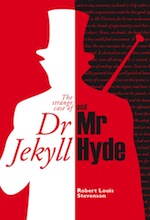 In this classic mix of sci-fi and horror, Dr. Jekyll creates a serum that transforms him into the younger, crueler, and remorseless Hyde, an alter ego that allows Jekyll to express the nastier aspects of his personality and urges without guilt. After taking the potion repeatedly, Jekyll doesn’t need the serum at all to unleash his inner demons, but instead grows dependent on the serum to remain conscious. It’s a fascinating exploration of shame and repression, society and evil, and the danger of substance abuse threads through the tale like a dirty needle.
In this classic mix of sci-fi and horror, Dr. Jekyll creates a serum that transforms him into the younger, crueler, and remorseless Hyde, an alter ego that allows Jekyll to express the nastier aspects of his personality and urges without guilt. After taking the potion repeatedly, Jekyll doesn’t need the serum at all to unleash his inner demons, but instead grows dependent on the serum to remain conscious. It’s a fascinating exploration of shame and repression, society and evil, and the danger of substance abuse threads through the tale like a dirty needle.
A Scanner Darkly by Philip K. Dick
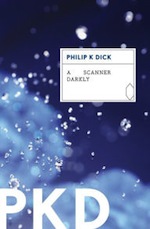 An undercover narcotics agent posing as a drug user, Bob Arctor becomes addicted to a gnarly psychoactive drug called Substance D, and falls in love with a drug dealer, Donna, whom he hopes will lead him to the high-level sources of the drug. Arctor’s use of Substance D causes, get ready for it … the two hemispheres of his brain to function independently. This means he begins to live parallel lives as both drug user and undercover narcotics agent, so when Arctor’s assigned to spy on his own household, he puts himself under surveillance. And if that’s not enough to put your brain in a paranoid spin, things get even worse when Arctor goes through a punishing withdrawal from the drug. In the afterword, Dick dedicated the book to those of his friends who died or suffered debilitation as a result of their drug use, and he included his own name on the list. Sobering, to say the least.
An undercover narcotics agent posing as a drug user, Bob Arctor becomes addicted to a gnarly psychoactive drug called Substance D, and falls in love with a drug dealer, Donna, whom he hopes will lead him to the high-level sources of the drug. Arctor’s use of Substance D causes, get ready for it … the two hemispheres of his brain to function independently. This means he begins to live parallel lives as both drug user and undercover narcotics agent, so when Arctor’s assigned to spy on his own household, he puts himself under surveillance. And if that’s not enough to put your brain in a paranoid spin, things get even worse when Arctor goes through a punishing withdrawal from the drug. In the afterword, Dick dedicated the book to those of his friends who died or suffered debilitation as a result of their drug use, and he included his own name on the list. Sobering, to say the least.
A Clockwork Orange by Anthony Burgess
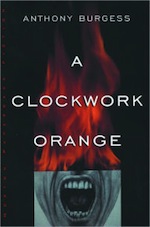 In a near-future dystopian England, gangs dose up on Moloko Plus (or “milk-plus”) before heading out to indulge in acts of random ultra-violence. Served at hangouts like the Korova Milk Bar, and laced with “vellocet,” “synthemesc,” or “drencrom,” this drink “sharpens up” the user for a night of mayhem, making it a fitting cocktail for this novel’s visceral exploration of choice and free will.
In a near-future dystopian England, gangs dose up on Moloko Plus (or “milk-plus”) before heading out to indulge in acts of random ultra-violence. Served at hangouts like the Korova Milk Bar, and laced with “vellocet,” “synthemesc,” or “drencrom,” this drink “sharpens up” the user for a night of mayhem, making it a fitting cocktail for this novel’s visceral exploration of choice and free will.
Sleepless by Charlie Huston
 A new disease makes it impossible for the afflicted to fall asleep in this apocalyptic near-future novel. Many of the sleepless have become addicted to computer games, losing themselves in an alternate reality in which insomnia is a virtue. Others seek “dreamer,” a rare drug that works as an antidote to the sickness. In Los Angeles, Parker Haas (whose wife and daughter are slowly dying from the sleepless disease) works undercover to find supplies of “dreamer,” before drug dealers and pharmaceutical companies can corner the market for the drug. The stakes keep escalating in this brilliant piece of speculative fiction filtered through a grimy noir lens.
A new disease makes it impossible for the afflicted to fall asleep in this apocalyptic near-future novel. Many of the sleepless have become addicted to computer games, losing themselves in an alternate reality in which insomnia is a virtue. Others seek “dreamer,” a rare drug that works as an antidote to the sickness. In Los Angeles, Parker Haas (whose wife and daughter are slowly dying from the sleepless disease) works undercover to find supplies of “dreamer,” before drug dealers and pharmaceutical companies can corner the market for the drug. The stakes keep escalating in this brilliant piece of speculative fiction filtered through a grimy noir lens.
Saga written by Brian K. Vaughan and illustrated by Fiona Staples
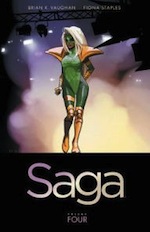 Struggling as an actor on the Open Circuit (an underground acting troupe that broadcasts across the galaxy) Alana tries a drug called Fadeaway, after learning half her co-stars are high on it. Staples beautifully captures the allure of the drug, rendering mind-melting and mind-expanding moments within the same frame. For Alana, it’s a perfect escape from a job she finds at best numbingly dull and at worst horribly humiliating. But when Alana’s husband, Marko, discovers his wife’s drug use, the ensuring argument becomes physical, and the resulting domestic abuse tragically separates the couple. Fadeaway’s role in the story continues, but I’ll not spoil it here. Even if you’re not typically a comic book reader, you should really try Saga. But be warned … it’s addictive.
Struggling as an actor on the Open Circuit (an underground acting troupe that broadcasts across the galaxy) Alana tries a drug called Fadeaway, after learning half her co-stars are high on it. Staples beautifully captures the allure of the drug, rendering mind-melting and mind-expanding moments within the same frame. For Alana, it’s a perfect escape from a job she finds at best numbingly dull and at worst horribly humiliating. But when Alana’s husband, Marko, discovers his wife’s drug use, the ensuring argument becomes physical, and the resulting domestic abuse tragically separates the couple. Fadeaway’s role in the story continues, but I’ll not spoil it here. Even if you’re not typically a comic book reader, you should really try Saga. But be warned … it’s addictive.
 Chris Howard was born and raised in England, and it was there he first began writing stories and songs. He now lives in Denver, Colorado, where he and his wife enjoy mountains, music, and mugs of good coffee. He is the author of Night Speed, as well as the Rootless trilogy.
Chris Howard was born and raised in England, and it was there he first began writing stories and songs. He now lives in Denver, Colorado, where he and his wife enjoy mountains, music, and mugs of good coffee. He is the author of Night Speed, as well as the Rootless trilogy.










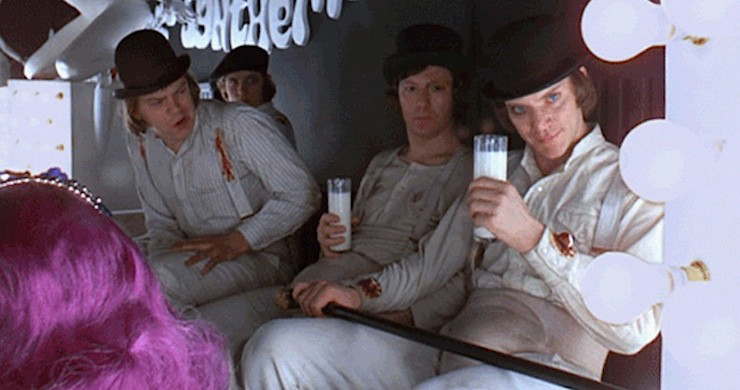
What, no TekWar? Where’s the Shatner-love?
And let’s not forget the blue-eyed gorilla in the room, Melange, from Frank Herbert’s seminal Dune series (although the less we talk about the mangling it received at the hands of Herbert the Younger and Kevin Anderson, the better)
Any list about SF books with revolving around drugs is absolutely remiss in not mentioning Stanislaw Lem’s The Futurological Congress. The whole plot revolves around the use of hallucinogenics on the populace by the government.
Tor.com, .
.
Two cases of mental time-travel by drug, Frank Belknap Long’s short story The Hounds of Tindalos and Daphne du Maurier’s late novel The House on the Strand. Neither proves exactly trouble-free; du Maurier’s time-traveller is endangered by the drug’s side-effects and his obsession with the past, while Long’s runs into the wrong sort of company.
Brave New World and Soma…
In THE PUPPET MASTERS, Heinlein’s secret-agent protagonist and narrator remarks a few times about taking drugs to enhance his endurance and to enhance his ability to speed-read and retain information that he’s researching. They’re pretty much “throwaway” remarks, giving the impression that such things are commonplace in that near-future world.
C’mon, we all want the Soy Sauce from John Dies at the End, right?
My first thoughts when seeing the title were “Neem” – Piers Anthony’s memory drug; “Thionite” – E.E. Smith’s Lensmen’s foe; and, as mentioned above, “Soy Sauce” – David Wong’s bane from “This Book is Full of Spiders” in addition to the original.
Seconded. :)
Chester Anderson’s novel The Butterfly Kid involves a drug which turns thoughts into reality, and causes highly amusing chaos. It was a Hugo nominee in 1968, one of only a few intentionally humorous Hugo nominees. It’s a bit hard to find these days, but worth a look.
Oh man, some long suffering synapses just fired and I’m half remembering a novel from the eighties (possibly earlier) that was Brave New World-esque and the protagonists avoided mandatory injections of brainwashy drugsby placing foil packets on their arms at the injection spot.
Afterparty by Daryl Gregory centers on a drug that makes people feel the presence of God… overdoses can cause you to have persistent hallucinations of religious imagery (whichever one you are predisposed to believe in, generally) that continue even after you’re clean.
Snow Crash.
In Alan Moore’s graphic novel series “Top Ten”, set in the superheroic city of Neopolis, there are such delights as Amazo pills, Mongoose Blood (AKA “Goose Juice”), which bestows super-speed, and Hyperdrine, a psychoactive so potent that your hallucinations take on solid forms which can persist for hours after the user’s death. . .
Maybe articles like this could be a bit longer. Tor does this a lot: take a really interesting topic and then barely scratch the surface of what an interesting discussion looks like.
There is of course the honey from Paradise VIII diluted with stroon (santa clara) that soothes Lavinia (in Norstrilia by Cordwainer Smith) and gives her the vision of the Daimoni on their home planet in Space3 or thereabouts.
How could you have forgotten it (and her)?
The Core of the Sun, by Johanna Sinisalo. Kind of like The Handmaid’s Tale meets “Finnish Weird,” and you’ll never look at chili pepper in the same way again.
This list is incomplete without CAN-D and CHEW-Z from PKD’s ‘The Three Stigmata of Palmer Eldrich’.
I had gone to bed and was reading this on my phone, but David Goldfarb’s post required me to get up, pull the book off the shelf, and riffle through my copy of The Butterfly Kid, whose recommendation I heartily echo on three grounds. First is Chester Anderson’s opening statement:
Whereupon he presents a tale featuring first person narrator Chester Anderson, a character based on (but not, he assures us) the actual Chester Anderson. Second is possibly my all-time favorite line of narration ever, from the middle of page 101 of the 1980 Pocket paperback:
And the third is the ending, in which Chester’s roommate (named after his then-real-life-roommate and fellow writer, Michael Kurland) observes:
I am possibly the last person in the immediate universe you’d expect to be endorsing a novel about Reality-Pill-popping counterculture hippie types, but I was wholly and irredeemably charmed by this one. I hadn’t known till now that it was a Hugo nominee, but it doesn’t surprise me.
Jeff Noon’s feathery hallucinogen, vurt.
Just list much of the oeuvre of Philip K. Dick and you have most of the drug influenced books in science fiction.
@11: “This Perfect Day”, by Ira Levin. Great book.
Drugs are for losers. Give me the tasp or a touch of current through a droud anyday.
Congrats on the new release, Chris!
May the forest be with you!
There are also the “Psycho-Chemical Aerosols” from Brian Aldiss’s Barefoot in the Head.
I second Dune mentioned by Mike Loux. Drug use runs all the way through the stories and Herbert explores the use of a “benevolent” drug.